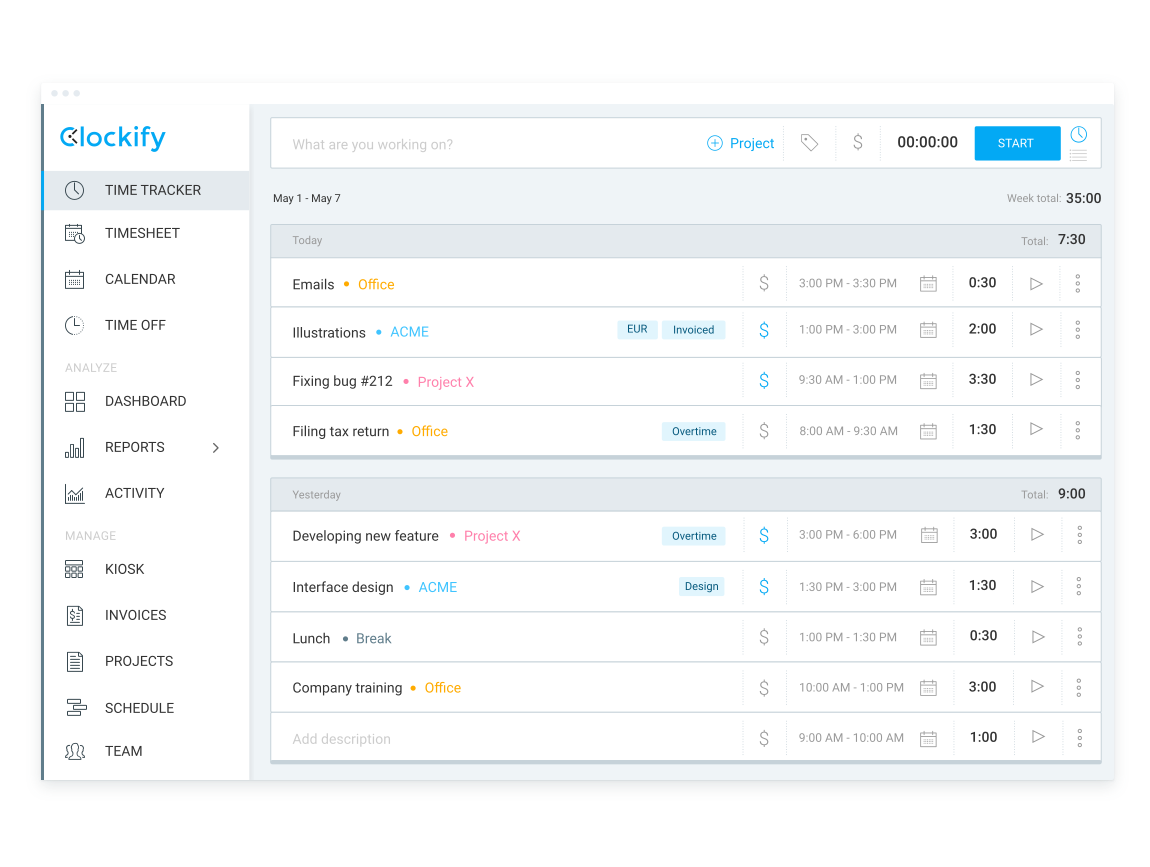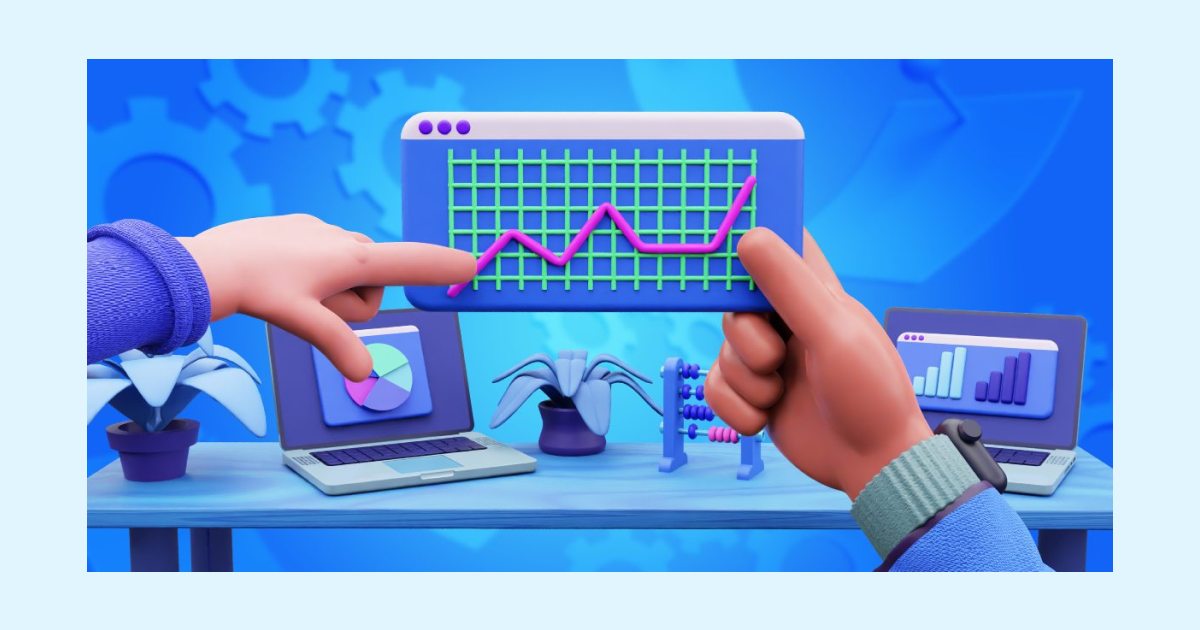Importance of time management + 10 time management tips
Last updated on: May 30, 2023
What if we told you that you can:
- Reach your dreams,
- Travel to exotic locations,
- Land your dream job,
- Finish your projects before the deadline,
- Get enough sleep every night, AND
- Spend enough time with loved ones — all within this one lifetime!
Yes, it’s possible, and the key is: good time management.
Today, you’ll understand the advantages of time management and learn:
- What good time management is,
- Benefits of good time management, with special emphasis on the workplace setting, and
- Useful tips to help you manage your time better.
Let’s begin!

Table of Contents
What is time management?
Time management presents how effectively you make use of your time.
Even though time management is a well-known term, many people are still confused about its actual meaning. So, we contacted experts for help in defining it.
One of them was Bryan Clayton, the CEO and co-founder of GreenPal. For Bryan, time management and smart planning go hand in hand:

“Time management is how you plan, organize, and do your tasks and activities in a smart way. ”
He also pointed out the importance of effective time management, which is not just doing more in less time, but doing the right things at the right time:

“You need to set clear and realistic goals, break them down into smaller tasks, prioritize them, schedule them, focus on one thing at a time, avoid distractions and procrastination, delegate or outsource what you can’t or shouldn’t do, check your progress and results, and adjust your plans as needed.”
Founder of The Literary Lifestyle, Julianne Buonocore, recommends a Financial Times Books of the Year and New York Times bestseller Four Thousand Weeks: Time Management for Mortals by Oliver Burkeman. Julianne shared the most important lessons from the book — that we need to accept the fact that time is finite:

“If we’re lucky and live to age 80, we have about four thousand weeks to live. Time management is not about masterfully squeezing as much as possible into those weeks. Rather, time management is about accepting there will never be enough time, so we need to focus on getting the most important things done with the time we are given.”
Finally, we can say that time management also means being aware of the time we have and making the most of it.
Why is time management important: Key benefits of time management
Knowing how to manage your time properly brings a number of great benefits to your work routine and life overall! Here are some of the perks of good time management.
Benefit #1: Time management helps you achieve your goals
When you understand why time management skills are important, you gain the motivation to stop sitting around and pursue your goals.
As a result of this hard work and newfound motivation, you reach your goals faster.
Benefit #2: Time management helps you become more organized
When you properly manage time, you get more done and save more time for activities you truly enjoy. Properly managing time includes:
- Making a to-do list,
- Allocating time to each item from your to-do list, and
- Scheduling those tasks on your calendar.
By following this routine, you’ll be easily able to stick to your plan and complete your daily tasks without stressing about them. You don’t have to worry about missing deadlines or forgetting errands — because you already planned your time in such a way that prevents such mishaps from happening.
For Founder & CEO of Deepwrk, Valeri Gervaziev, being organized is at the core of time management:

“Having a plan is the cornerstone of good time management. Without a daily, weekly, or long-term plan, it’s all too easy to veer off course.”
Benefit #3: Time management helps with achieving work-life balance
Among the essential effects of good time management is more free time.
More free time means you have more time to spend with your loved ones, practice a hobby, or even go on a trip abroad. This all results in a healthier work-life balance!
A family law expert and chief of divorce evolution at Divorce.com, Laura Wasser, explains the importance of effective time management for work-life balance:

“Time management is a tool for reducing workplace stress and fostering a better work-life balance. It’s like having an explicit, well-documented agreement — everything runs more smoothly when everyone knows what to expect.”
💡 Clockify Pro Tip
Looking for fun things to do in your leisure time that will help you stay productive at the same time? Check out this article:
Benefit #4: Time management helps you feel better
Now you must be wondering — how can time management help you feel better?
When you properly manage time, you’ll enjoy the feeling of success a completed to-do list brings. You feel more capable of doing anything on your agenda.
You’ll see how you can live up to your expectations and in turn, feel a boost of self-confidence about your abilities. In addition, reducing the amount of stress in your life helps you avoid serious issues such as mental fatigue.
Laura Wasser explains how proper time management can help you find balance in life and feel much better:

“It [time management] helps you achieve balance and control in your life, freeing up time for the things that truly matter — like spending time with loved ones or taking a moment for yourself. It’s like finally reaching an agreement in a tough negotiation, there’s a sense of relief, accomplishment, and you suddenly find you have time for a well-deserved break.”
Benefit #5: Time management helps you improve your lifestyle
Proper time management makes sure you spend less time busy as a bee but as productive as a sloth on a duvet day.
You’ll be able to single out your work priorities and schedule your time in such a way that you manage to both attend your daughter’s recital and go over some crucial project issues with a client.
For Stacy Ennis, the best-selling author, coach, and speaker, time management is essential for improving our lifestyle as it leaves more time for activities we enjoy:

“Good time/energy management honors the ebb and flow of our bodies and brains and lets us tap into our most productive selves — not in a way that depletes us but rather makes more space in our lives. Win-win!”
The importance of time management in the workplace
Time management is essential in life overall — but it’s especially important in the workplace. So, how does time management help with our work?
Laura Wasser illustrates how crucial time management is in the workplace — by comparing time management with the legal industry:

“Time management is as essential as having a good lawyer when you’re facing a court case. It helps you meet deadlines, improves your decision-making ability, and offers a better chance to achieve your career goals.“
Thus, here are the crucial benefits of effective time management in the workplace.
Benefit #1: Time management helps you avoid missing deadlines and appointments
Deadlines and appointments are often difficult to keep track of.
To keep yourself on track with your work and finish on time, you need to make sure you start on time — you’ll also need to ensure you divide your work into manageable chunks you’ll be able to tackle in the predefined time periods.
Bryan Clayton believes good time management helps us keep up with all of our deadlines and appointments, which makes us more productive and leads to exceeded expectations:

“You can deliver high-quality work on time and within budget. You can meet or exceed your expectations and standards.”
Benefit #2: Time management helps you procrastinate less
According to Valeri Gervaziev, procrastination is “a response to negative emotions, such as stress or anxiety, that we associate with certain tasks.”
When you know you’re working on a fixed schedule with tasks allocated to specific time slots in the day, it’ll be easier for you to focus — because you’ll know you have personal deadlines to meet for each task. Thus, you’ll procrastinate less.
💡 Clockify Pro Tip
Still struggling with procrastination? Check out this guide:
Benefit #3: Time management helps you avoid unwanted stress
Racing to beat a deadline is stressful because you don’t know whether you’ll succeed. Increased pressure over time can lead to more serious problems such as career burnout.
But, smart time management helps you view your workday, not as a whole, but as a set of tasks you need to go through. Once you have all your tasks with the specific time you need to finish each of them, it’s easier to single out priorities and make arrangements that help you minimize such stress.
For Bryan Clayton, time management is all about reducing your stress levels:

“You can avoid overwhelm and frustration. You can cope with pressure and uncertainty and prevent fatigue and exhaustion.”
Benefit #4: Time management helps you maintain your professional reputation
Missing deadlines, forgetting meetings, and rushing projects is an expected outcome of poor time management — one that will likely put a dent in your reputation if given enough time.
But, proper time management at work eradicates these possibilities and helps you build and maintain your professional reputation!
In line with that, Bryan Clayton also believes that good time management is beneficial for your professional reputation:

“Good time management can help you build trust and confidence with your clients, customers, colleagues, managers, and stakeholders. You can show your reliability and professionalism.”
💡 Clockify Pro Tip
Maintaining a professional reputation and building trust are essential for success! Read more about building trust in remote workplaces here:
Benefit #5: Time management helps you avoid financial penalties
There is more to your business than just project deadlines — for example, you’ll need to make sure you pay taxes on time. That is, unless you want to pay an additional 5% fee for every month your return is late.
If you allocate a specific time slot on your calendar to handling taxes and other expenses in your business, you’ll avoid any penalties.
Why do we waste our time?
A recent UK study showed that people spend almost 2 hours every day doing absolutely nothing. That’s almost a month wasted each year! Moreover, 56% of study participants understand the importance of better time management. However, family and work-related obligations frequently stand in the way of them being their most productive selves.
Before you can stop wasting time, you need to understand why you waste it in the first place.
Bryan Clayton highlighted key reasons why people waste time:
- Lack of clarity — no specific and measurable goals or action plans,
- Lack of motivation — absence of a purpose or incentive to use our time better,
- Lack of discipline — no willpower to resist temptations or distractions, absence of habits or routines that support our goals,
- Lack of skills — absence of knowledge or abilities to do the tasks or activities we need to do, and
- Lack of feedback — no way to measure our progress or results and the lack of feedback or guidance that can help us improve or fix our mistakes.
So, your first step in preventing time waste is determining which of these factors are detrimental to your time management. Then, you can start working on them and slowly incorporating some of the tips we’ll present to you in this article.
💡 Clockify Pro Tip
According to Parkinson’s law, people tend to adjust their pace to their workload and the amount of time they have to finish it. If you recognize yourself in this, you might want to check out this article:
How to improve time management — Top 10 time management tips
Once you’ve done away with wasting time, you’ll want to learn how to use it wisely!
You’ll do that by utilizing your time management skills and choosing effective time management strategies.
💡 Clockify Pro Tip
There’s always room for improving your time management skills. To dive deep into effective time management, check out this guide:
Tip #1: Set your goals
“People with goals succeed because they know where they’re going.” — Earl Nightingale
Unless you’re aware of what you want to achieve, you won’t be able to plan the steps that will lead you to your goals. If you aren’t sure about your overall objectives and didn’t set concrete career goals, you could try journaling your thoughts and dreams over time.
Run through what you’ve written so far, and define your goals — if you were honest about your dreams in your journal, you’ll be able to turn your wants into concrete goals. Having a fixed objective saves you a lot of time and keeps you in deep work.
💡 Clockify Pro Tip
If you’re looking for the best way to set and track your goals, try out this technique:
Tip #2: Keep your goals to yourself
You may think keeping your goals to yourself is counterproductive — after all, isn’t it a common saying that if you want your dreams to come true you have to share them with others?
But, it’s the exact opposite of that.
According to entrepreneur and author Derek Sivers and several studies, people who declare their goals to the world are statistically less likely to reach said goals.
This is tied to the fact that people pursue goals because of the satisfaction they feel when they reach them, and people who announce what their goals are, already feel this satisfaction. That renders actually reaching their goals unnecessary.
So, next time you feel the urge to tell someone about your dreams, goals, and aspirations — don’t. This might not seem like a logical time management technique, but, statistically, it’s an effective one.
Tip #3: Create a plan
When you make a plan, you’re less likely to lose your way, and thus less likely to fail.
To properly plan, you have to assess your goals once again. Then, list the tasks and actions that help you reach them, and do away with anything you believe to be a distraction.
A software Developer at Clockify, Milena Savatovic, highlights the importance of planning and writing down our tasks:

“My most helpful time management hack is writing my plan in a journal. At the end of the workday, I like to write down all the tasks I have to do tomorrow and try to make a schedule for myself for that day. I always leave some room for unforeseen situations and try not to overload the schedule, that is, to distribute the work as realistically as possible.”
Furthermore, Laura Wasser offers a unique perspective on handling your daily schedule — treating your time like money:

“ Allocate a certain amount of time for each task, similar to how you’d allocate money for different expenses. It helps keep things in perspective and avoids overspending time on less critical tasks.”
💡 Clockify Pro Tip
Are you having issues with creating a plan? You could try some of our time block templates:
Tip #4: Make decisions
“Maturity is when you stop complaining and making excuses in your life; you realize everything that happens in life is a result of the previous choice you’ve made and start making new choices to change your life.” ― Roy T. Bennett
Unless you make up your mind about the road you want to take, you’ll hardly ever make it past the intersection. But, as waiting around and procrastinating gets you nowhere, it’s best that you work up the courage and make a choice.
When you manage your time properly, you don’t feel as pressed for time, and you don’t feel as pressured when making decisions. As a result, you’ll make better decisions overall.
In her Harvard Business Review article, Sabina Nawaz, CEO coach, leadership keynote speaker, and writer, recommends starting small when making decisions about the future. She believes big goals are achieved through micro-decisions we make on a daily basis.
So, if you’re unsure about a decision, ask yourself:
“What’s the very first step I need to take that will get me to the next point in my plan?”
Tip #5: Focus on important tasks first
Once you’ve prioritized and organized what’s actually important, the next step is to focus on your priorities. If you let your mind wander off to other, less important actions, you’ll hardly ever finish what you’ve started.
For instance, Julianne Buonocore always places her most important tasks at the beginning of the day and only does the least important ones if she has time left.
Laura Wasser recommends following the idea of “eating the frog:”

“It’s about tackling the most challenging task first thing in the morning, like dealing with the most contentious issue in a negotiation right out of the gate. Once that’s out of the way, the rest of the day tends to feel much more manageable.”
To avoid spending too much time on minor tasks, Stacy Ennis suggests batch emailing:

“Check your emails two times per day. Period. This is a top way to increase focus and productivity, letting you potentially 4x your work and effectiveness.”
💡 Clockify Pro Tip
If you like to multitask and want to learn how to handle multiple projects and tasks successfully, this article will help you:
Tip #6: Minimize distractions
Minimizing distractions is among the best time management methods. That’s because it helps you avoid wasting time on unimportant activities.
A Software Developer at Clockify, Nenad Pejcic, highlights the importance of minimizing distractions for the proper use of one’s time. He specifically mentions keeping your phone away from you when working, to ensure you’re fully concentrated on every task at hand.
Moreover, Stacy Ennis recommends turning off all notifications:

“The number of people who have chimes going off all day is complete madness! How can anyone focus with beeps and bings all day? Turn off ALL notifications on your phone and computer, except for silent notifications for texts. Email notifications on the phone — even silent ones — is a big no as well.”
She also suggests buying earplugs to help fight distractions:

“This is my #1 productivity hack that enables me to work in ANY space, including my own home when my kids are being exceptionally loud. Simple Mack’s earplugs from Amazon do the trick — no need for fancy Bose noise-canceling headphones.”
💡 Clockify Pro Tip
Getting rid of distractions is just one of the many ways to stay focused at work. Learn more methods of maintaining your focus:
Tip #7: Make sure to rest
In the words of Bojan Pavlovic, a Software Developer at Clockify: “No amount of time management will help you if you are not properly rested.”
Making sure that you are getting enough sleep and taking regular breaks is as important as properly scheduling your tasks. That’s because you’ll be much more efficient when you’re well-rested. Moreover, you’ll avoid feeling overwhelmed and overworked!
For Julianne Buonocore, a key to being rested and ready for new challenges is committing to work-free weekends and setting boundaries around them.
Aside from quality sleep, setting boundaries, and taking breaks, you can also work on end-of-workday rituals to reduce the tension after a long day.
Tip #8: Find an organization technique that works
“For every minute spent in organizing, an hour is earned.” — Benjamin Franklin
You can choose from several great organization techniques:
- You can start with the Eisenhower Matrix — the solution that lets you distinguish the important from the urgent (but not important),
- Another solution is the Pomodoro technique — great for taming serial procrastinators, or
- A simple, yet effective technique is time blocking — works best in the context of taking control of your time and achieving a better work-life balance.
Furthermore, Bryan Clayton recommends trying out the Pareto principle:

“The Pareto principle says that 80% of the results come from 20% of the efforts. Find out the 20% of tasks that will bring you the most value or impact for your goals. Focus on those tasks first and do them well. Eliminate or delegate the rest of the tasks that are not essential or relevant.”
Tip #9: Track the time you spend on tasks
We’re often pressed for time, so the way we spend it should be optimized. This is where tracking the time we spend on our tasks using time tracking software comes in handy.
For example, Clockify is time management software that can help you track your time easily and effectively. The software itself offers a bunch of useful features, such as a time tracker, calendar, and scheduling — all of which can help you stay organized and on top of your tasks.

Stacy Ennis recommends Clockify to anyone looking to add more order to their schedule:

“I encourage people to think of energy management and focus on blocking their days to support their best use of energy. One of the first ways to uncover this is by tracking one’s time — and Clockify is a great tool to do so! When doing so, they should note how they felt and how focused they are, which will provide insights into how to organize their calendars to support productivity.”
Tip #10: Work on your weaknesses and ask for help
“Alone we can do so little; together we can do so much.” — Helen Keller
You can’t be the best at everything. Luckily, once you determine your weaknesses, you can:
- Work on strengthening those skills,
- Delegate some of your tasks, and
- Rely on tools designed to make your daily activities easier.
For example, communicating and collaborating with peers and colleagues helps you do more in less time — because there’s more of you doing it.
The same goes for your friends and family. You can save a lot of time in life if you would just let your loved ones help you, either directly, or with their advice and guidance.
What’s more, you can find great tools that may help you work on some of your weaknesses. Junior Java Developer at Clockify, Milana Todorovic, explains the value of finding tools that suit your needs:

“Determine your weaknesses and find things that help you with specific time management problems. My biggest issue is remembering what I need or want to do, so the most useful techniques for me include relying on a tool that helps me remember my tasks.”
Conclusion: Good time management helps us maintain balance in life
Good time management is essential for maintaining balance in life as it helps you:
- Achieve what you want faster,
- Become more organized,
- Get more leisure time,
- Feel better, and
- Improve your lifestyle.
In the words of Laura Wasser, time management is all about balancing your work and free time:

“Effective time management is about balancing work with relaxation, making sure you’re productive, but also taking care of your own wellbeing. When you do it right, you can reduce stress, avoid the rush, and be satisfied with achieving your goals — it’s a win-win situation.”
✉️ How important is time management for you? Do you find the advice we listed here useful? Is there anything you would add? If there is, let us know at blogfeedback@clockify.me — we may include your tips in this or a future blog post!





